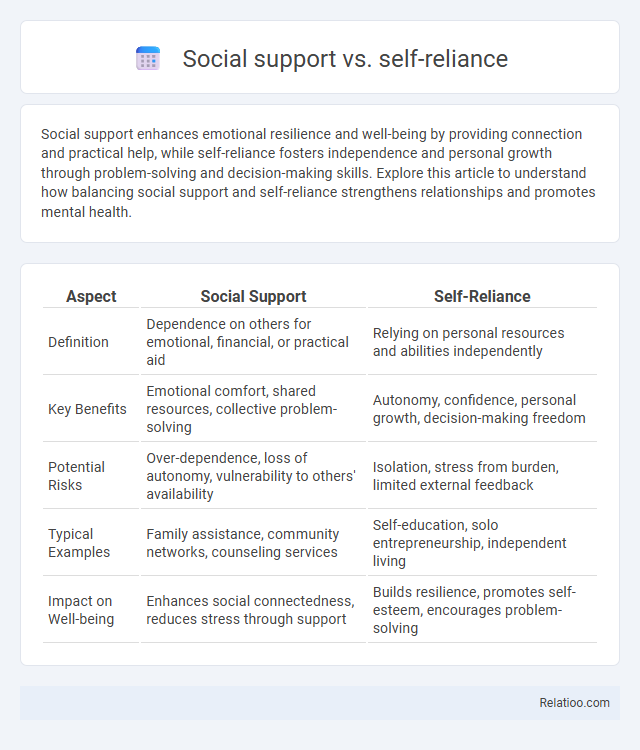Social support enhances emotional resilience and well-being by providing connection and practical help, while self-reliance fosters independence and personal growth through problem-solving and decision-making skills. Explore this article to understand how balancing social support and self-reliance strengthens relationships and promotes mental health.
Table of Comparison
| Aspect | Social Support | Self-Reliance |
|---|---|---|
| Definition | Dependence on others for emotional, financial, or practical aid | Relying on personal resources and abilities independently |
| Key Benefits | Emotional comfort, shared resources, collective problem-solving | Autonomy, confidence, personal growth, decision-making freedom |
| Potential Risks | Over-dependence, loss of autonomy, vulnerability to others' availability | Isolation, stress from burden, limited external feedback |
| Typical Examples | Family assistance, community networks, counseling services | Self-education, solo entrepreneurship, independent living |
| Impact on Well-being | Enhances social connectedness, reduces stress through support | Builds resilience, promotes self-esteem, encourages problem-solving |
Introduction: Defining Social Support and Self-Reliance
Social support refers to the network of family, friends, and community resources that provide emotional, informational, and practical assistance. Self-reliance emphasizes an individual's ability to independently manage challenges and make decisions without relying heavily on external help. Understanding the balance between your self-reliance and available support systems is essential for maintaining mental resilience and overall well-being.
The Psychology Behind Social Support
The psychology behind social support highlights its critical role in reducing stress and promoting mental health by fostering a sense of belonging and emotional security. While self-reliance emphasizes personal coping mechanisms and independence, an effective support system combines both external assistance and internal resilience, enhancing overall psychological well-being. Research in social psychology demonstrates that individuals with strong social networks experience lower rates of anxiety and depression, underscoring the importance of balanced social support alongside self-reliance.
The Benefits of Self-Reliance
Self-reliance enhances your problem-solving skills and builds resilience, enabling you to confidently navigate challenges without over-dependence on others. While social support and a strong support system provide emotional and practical aid, cultivating self-reliance ensures sustainable personal growth and independence. This balance empowers you to make informed decisions and maintain control over your life's direction.
Balancing Social Support and Self-Reliance
Balancing social support and self-reliance involves leveraging external networks like family, friends, and professional resources while cultivating personal coping skills and independence. Effective support systems enhance emotional resilience and provide practical assistance, yet over-reliance can hinder personal growth and problem-solving abilities. Integrating social support with self-reliance fosters a dynamic approach to managing stress, promoting mental health and adaptive functioning.
Cultural Perspectives on Support and Independence
Cultural perspectives greatly influence the balance between social support and self-reliance, shaping how individuals perceive and utilize their support systems. In collectivist cultures, strong social support networks often emphasize communal well-being and interdependence, whereas individualistic cultures prioritize personal independence and self-reliance. Understanding your cultural background helps navigate these dynamics effectively, ensuring that you leverage support systems in a way that aligns with your values and promotes resilience.
Social Support: Impact on Mental Health
Social support plays a critical role in mental health by providing emotional, informational, and practical assistance that reduces stress and enhances coping strategies. Your engagement with a supportive network can lower the risk of depression and anxiety while promoting resilience during challenging times. Compared to self-reliance, which emphasizes individual resourcefulness, a robust support system ensures sustained well-being through collective encouragement and shared experiences.
Self-Reliance: Building Personal Resilience
Self-reliance cultivates personal resilience by empowering individuals to trust their problem-solving abilities and adapt independently to challenges. Developing self-reliance strengthens mental toughness, emotional stability, and decision-making skills critical for overcoming adversity without constant external assistance. Although social support and support systems provide valuable resources, self-reliance remains essential for sustained personal growth and long-term resilience.
When to Seek Help vs. Going It Alone
Recognizing when to seek help from a support system versus relying on self-reliance is crucial for mental well-being and personal growth. Your ability to balance social support and independent problem-solving enhances resilience and prevents burnout during challenging times. Effective decision-making about going it alone or engaging with a support network depends on the complexity of the issue and your emotional resources.
Common Misconceptions About Dependency
Common misconceptions about dependency often conflate social support with weakness, ignoring that effective support systems enhance resilience and well-being. Self-reliance is frequently idealized, yet complete independence can lead to isolation and stress without a reliable network. Understanding that healthy dependency within a supportive framework fosters growth and balance challenges the stigma surrounding asking for help.
Finding Your Optimal Support-Self-Reliance Balance
Balancing social support and self-reliance is essential for maintaining mental well-being and personal growth. Understanding when to seek help from your support system and when to rely on your own abilities allows you to optimize resilience and problem-solving skills. Finding your optimal support-self-reliance balance involves recognizing your unique needs, boundaries, and strengths for healthy, sustainable independence.

Infographic: Social support vs Self-reliance
 relatioo.com
relatioo.com